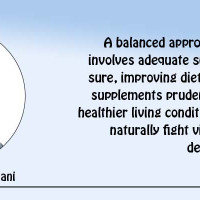- Monday, 12 January 2026
Drink Adequate Amount Of Water
Our body is made up of about 50-70 per cent of water. Water is essential and needed for every single body function. It clears toxins from our organs, carries nutrients to the cells, cushions our joints, and helps digest the food we eat. The body continuously loses water throughout the day. It is lost mostly through urine and sweat but also from regular body functions such as breathing. Therefore, in order to prevent dehydration, our body needs to get an adequate amount of water from drinking and food every day.
It is important to get water as our body needs it every day to carry out many vital functions. There is no fixed amount of water that is needed for everyone. How much water is needed depends on the body size, how many activities we do, how hot the weather is, and other many things. Our body depends on water to survive. Every cell, tissue, and organ of our body needs water to function properly. Water excretes wastes mainly through urination and perspiration. It keeps body temperature normal, lubricates and cushions joints, and protects sensitive tissues of our body.
Dehydration
Insufficient water in our bodies can lead to dehydration. It is a condition that occurs when we do not have enough water in our bodies to carry out normal functions. Even mild dehydration can drain energy and make us tired. Some people require more or less water, depending on a variety of factors, including activity level, age, body size, temperature, humidity, sun exposure, and health status. People will likely also need to drink more water if the diet is high in salty, spicy, or sugary foods. People drinking a lot of coffee and other caffeinated beverages might lose more water through extra urination. We need more water in hot, humid, or dry areas.
Similarly, we need more water if we live in the mountains or at a high altitude. More water is necessary for people who don’t eat a lot of hydrating foods that are high in water like fresh or cooked fruits and vegetables. Moreover, the body needs more water in warmer months than cooler ones due to increased perspiration. People who spend more time outdoors in the sun or hot temperatures or in a heated room might feel thirstier faster. In case of an infection or a fever, or when one loses fluids through vomiting or diarrhea, we will need to drink more water. People having health conditions such as diabetes need more water. Some medications like diuretics can also make us lose water and thus need more water.
Some authorities have recommended total water intake from all sources for adults between 19 and 30 years of age is 3.7 litres for men and 2.7 litres for women and pregnant mothers need extra 0.3 litres. Breastfeeding mothers need an additional 0.7 to 1.1 litres. People can consume water by drinking it and other fluids and eating foods high in water, such as fruits and vegetables. It has been estimated that around 20 per cent of water intake comes from food, and the rest is from fluids. However, this depends on the composition of the diet. Water can be obtained from foods high in water, such as fruits and vegetables. Thus, a higher intake of fresh fruit and vegetables supplies a higher amount of water.
During exercise and for athletes more water is needed than usual. The amount of drink for athletes depends on the type and intensity of the activity, and environmental factors, such as temperature, size, and muscle mass. People who work outdoors in hot climates or carry out vigorous exercise may need more water. Our body has sensitive natural mechanisms that maintain appropriate fluid levels. There are two main mechanisms the body maintains water balance both through thirst and urine output. The kidneys regulate electrolytes such as sodium and potassium balance in the body fluids.
Risks
There are a few risks of consuming too much water. Consuming too much water could lead to hyponatremia, or water intoxication, in which sodium levels in the blood plasma become too low. Symptoms of hyponatremia include lung congestion, brain swelling, headache, fatigue and lethargy, confusion, vomiting, seizures, coma, and even death. Anyone who feels dehydrated at night or is at risk of dehydration should drink some water as there are a few specific benefits of drinking water before bed.
However, drinking water before going to bed can increase the risk of nocturia and affects the quality of sleep. Lack of quality sleep can have a significant impact on the quality of life as memory, concentration, and mood can be negatively affected by sleep deprivation. At the same time, lack of adequate quality sleep increases the risk of a range of disorders such as obesity, heart disease, diabetes, and depression. A take-home message is to drink recommended amount of water daily but largely depends on factors such as age, activity level, and environment.
(Dr. Lohani is the clinical director at the Nepal Drug and Poison Information Centre. lohanis@gmail.com)

















